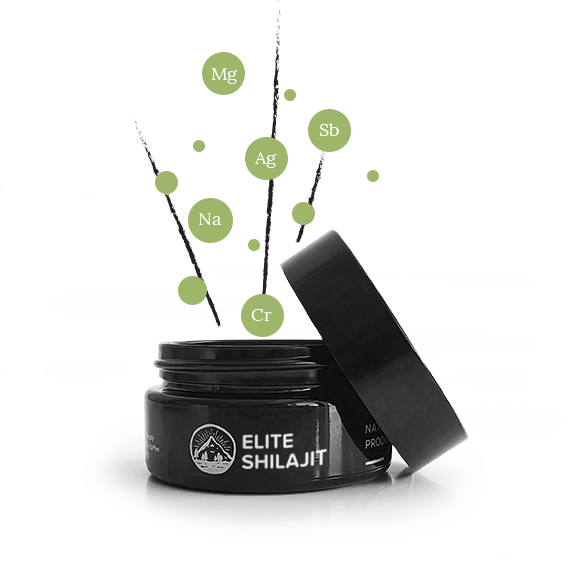Natural shilajit resinIngredients |  Fulvic acidFulvic acid is a powerful antioxidant and has an anti-inflammatory effect.
Fulvic acid is a powerful antioxidant. It has been proven to stimulate brain activity and inhibit the aggregation of tau protein, which is vital for the emergence or development of the Alzheimer’s disease. It is the most powerful natural electrolyte and has an anti-inflammatory effect. Fulvic acid attracts many vitamins, minerals and other substances to itself, thus feeding them to body cells and providing cell balance. At the same time, fulvic acid increases energy and accelerates regeneration. Humic acidHumic acid is important for the enhancement of the immune system and has an anti-inflammatory effect.Humic acid also attracts many vitamins and minerals to itself, thus ensuring that vitamins and minerals travel faster via the bloodstream to cells. Humic acid is an extremely important substance for the strengthening of the immune system and has powerful anti-inflammatory properties. Research has shown that humic acid inhibits the inflammation and swelling of joints. Furthermore, humic acid is important for the regeneration of damaged tissue and bones. SeleniumSelenium is the key mineral for the proper functioning of the human body.Selenium is the key mineral for the proper functioning of the human body. Selenium plays an important role in digestion and normal thyroid activity, and is crucial for human health. Moreover, it is extremely beneficial to the immune system and cognitive abilities, while preventing cardiovascular diseases. PotassiumPotassium is a vital agent in the function of the nervous system.
Potassium is crucial for the function of the nervous system, as it plays a vital role in the activation of nerve impulses through the nervous system. Nerve impulses help balance muscle contractions, heart pulse, reflexes and many other processes in the body. Furthermore, potassium reduces blood pressure and prevents osteoporosis and kidney stones. Present-day diet does not provide a sufficient intake of potassium. CalciumCalcium plays an important role in many basic life functions.
Calcium plays an important role in many basic functions of the human body. The human body needs calcium for blood circulation, muscle function and release of hormones. Calcium also helps transmit messages from the brain to other body parts. Furthermore, it is vital for dental and bone health, as it affects the structure and strength of bones in the human body. The latter is unable to produce calcium on its own, which is why calcium needs to be ingested with food. ManganeseManganese is a mineral that is vital for normal function of the brain and nervous system.
Manganese is a mineral that is needed for normal function of the brain, nervous system and many other enzyme systems of the human body. Although the human body stores up to 20mg of manganese in kidneys, liver, pancreas and bones, manganese also needs to be ingested with food for optimal body function. Manganese plays an important role in metabolism, controls blood sugar levels, reduces inflammatory reactions, relieves and prevents premenstrual cramps and helps maintain a healthy thyroid. MagnesiumMagnesium is one of seven key minerals needed by the body for normal function.
Magnesium is one of seven key minerals needed by the body for normal function. Magnesium is involved in numerous processes in the human body, which is why it needs to be ingested in large quantities. Even a healthy diet often does not provide sufficient amounts of magnesium. Adequate intake may help prevent problems with bones, cardiovascular system, diabetes and other disorders. IronIron is the main component of haemoglobin.
Being the main component of haemoglobin, iron is an extremely important mineral. Haemoglobin is a substance found in red blood cells that binds oxygen, thus carrying it via the lungs throughout the body. Iron deficiency causes anaemia, where the main symptoms reveal as fatigue, headaches, accelerated heart activity and dizziness. More than 80More than 80 other natural ingredients ...Elite shilajit also contains many trace minerals. The human body possesses very small quantities of such minerals, ordinarily less than 5 grams per organism. Furthermore, the recommended daily intake is small, usually up to 100mg a day. Despite minimal presence in the body, such minerals are vital for the normal function of the human body (electrolytes, metabolism, energy, detoxification, hormone balancing, etc.). The trace minerals found in Shilajit include: zinc, iodine, fluoride, copper, sodium, chlorine, phosphorous, zinc , chromium, cobalt, bromine, nickel, boron, silicon, vanadium, lithium, aluminium, strontium, germanium, lead, rubidium, tin, etc. In addition to minerals, Shilajit also contains a number of organic acids, carbon-60 and many more.
|